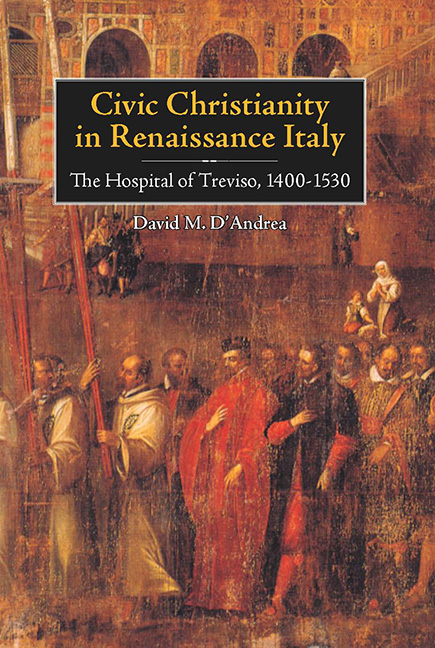Book contents
- Frontmatter
- Contents
- List of Illustrations
- Acknowledgments
- List of Abbreviations
- Notes to the Reader
- Introduction
- Chapter 1 The City of God
- Chapter 2 The Confraternal Family
- Chapter 3 The Bonds and Bounds of Charity
- Chapter 4 Medical Care and Public Health
- Chapter 5 Instruction for This Life and the Next
- Chapter 6 Crisis and Reform
- Notes
- Bibliography
- Index
Chapter 5 - Instruction for This Life and the Next
Published online by Cambridge University Press: 08 April 2017
- Frontmatter
- Contents
- List of Illustrations
- Acknowledgments
- List of Abbreviations
- Notes to the Reader
- Introduction
- Chapter 1 The City of God
- Chapter 2 The Confraternal Family
- Chapter 3 The Bonds and Bounds of Charity
- Chapter 4 Medical Care and Public Health
- Chapter 5 Instruction for This Life and the Next
- Chapter 6 Crisis and Reform
- Notes
- Bibliography
- Index
Summary
You must therefore listen to instruction, so that you have knowledge. For as Solomon said, “He that loveth correction, loveth knowledge; but he that hateth reproof is foolish.” In one place, “Receive my instruction, and not money; choose knowledge rather than gold.” And another place, “He that maketh his house high, seeketh a downfall; and he that refuseth to learn, shall fall into evils.” “Good instruction shall give grace.” And another, “A wise heart shall acquire knowledge, and the ear of the wise seeketh instruction.” And another, “Cease not, O my son, to hear instruction, and be not ignorant of the words of knowledge.” And another, “Let thy heart apply itself to instruction, and thy ear to words of knowledge.” And Jesus son of Sirach said, “My son, from thy youth up receive instruction, and even to thy grey hairs thou shalt find wisdom.” And another, “Hear, O ye children, the discipline of the mouth; and he that will keep it shall not perish by his lips, nor be brought to fall into most wicked works.”
—Albertano da Brescia, On Love and Affection for God, Neighbor, and Other Goods and the Form of Life (1238)
A lay member of a medieval confraternity in Brescia, Albertano of Brescia (c.1190–c.1250) outlined the religious life of an active confraternity dedicated to the common good. Albertano's conception of religiously infused civic life found expression in the medieval communes as well as in Renaissance states. The confraternity of Santa Maria dei Battuti, itself governed by legally trained brothers, closely followed Albertano's inspirational treatises and linked education with religious ideals. The confraternity embraced the proposition that religion and learning imposed a primary obligation to benefit society and supported vocational training, grammar schools, university scholarships, and religious instruction. As providers and administrators of the training required for a variety of occupations and careers, the Battuti had significant influence on the community, fostering an educational system that was both practical and spiritual.
The brothers had a considerable responsibility for the future. Entrusted with the lives of abandoned children and orphans, they were challenged to provide their wards with the skills for success in civic life. Children under the care of the institution were evaluated and provided with the appropriate training, both to expedite their integration into society and to relieve the financial burden of the charitable organization.
- Type
- Chapter
- Information
- Civic Christianity in Renaissance ItalyThe Hospital of Treviso, 1400–1530, pp. 109 - 132Publisher: Boydell & BrewerPrint publication year: 2007



